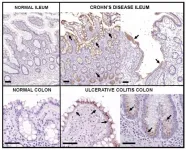(Press-News.org) A new study of mice and lab-grown human colon “organoids” indicates that an experimental drug developed by Johns Hopkins Medicine researchers can substantially reduce symptoms of inflammatory bowel disease (IBD) in pre-clinical models.
The experimental drug, given orally, inhibits a gut enzyme that is overproduced in people and in animal models of IBD, a disorder estimated by the U.S. Centers for Disease Control and Prevention to afflict more than 3 million adult Americans.
A report on the new study was published Aug. 9 in Science Translational Medicine.
IBD, a disease category that includes Crohn’s disease and ulcerative colitis, is an autoimmune disorder marked by immune system cells that overreact and attack healthy tissue. The process results in chronic inflammation of the gut, abdominal pain, diarrhea, weight loss and rectal bleeding. Current treatments rely mostly on anti-inflammatory drugs such as steroids, along with other immune system suppressors, diet and lifestyle changes, or surgery to remove or bypass diseased intestinal tissue. However, many people with IBD experience debilitating symptoms even with treatment.
“There is a huge need to develop new therapies for IBD patients because about 40% are not benefiting from current treatments,” says Barbara Slusher, Ph.D., M.A.S., director of the Johns Hopkins Drug Discovery program, professor of neurology at the Johns Hopkins University School of Medicine, and the study’s senior and corresponding author. “The idea that we’ve discovered a brand new therapeutic target and successfully developed a well-tolerated and efficacious pill to inhibit the target is really exciting.”
Slusher explains that the activity of the target enzyme, gastrointestinal glutamate carboxypeptidase II (GCPII), is highly upregulated in patients with IBD compared to people without the disorder.
“Our new GCPII inhibitor drug was designed to be gut restricted, meaning it stays in the gut with minimal exposure to the rest of the body when given orally,” says Rana Rais, Ph.D., associate professor of neurology and the director of drug metabolism and pharmacokinetics for Johns Hopkins Drug Discovery. “This targets gastrointestinal GCPII while limiting systemic side effects.”.
In the new studies, (S)-IBD3540, the experimental GCPII-inhibiting drug Slusher and her team developed, was tested in two mouse models of colitis. Results showed that the drug blocked about 75% of the colon GCPII activity. As a result, the treated animals showed improved stool consistency, less rectal bleeding and decreased colon inflammation, with no apparent adverse side effects. The drug also showed protective results when tested in a human colon organoid injury model grown from patient biopsy tissues.
“This is the first demonstration of an oral GCPII inhibitor protecting gut function,” says Diane Peters, D.V.M., Ph.D., M.S., assistant professor of pharmacology and molecular sciences and first author of the study. “(S)-IBD3540’s efficacy in mice and human pre-clinical models, with no evidence of toxicity, is highly encouraging.”
In a 2016 study, a Johns Hopkins University team led by Slusher was the first to identify that GCPII enzymatic activity in the gut was elevated up to 4,100% in patients with IBD, and that inhibiting the excess activity was robustly therapeutic in multiple murine IBD models.
“While we are still trying to understand exactly why this enzyme is upregulated in IBD patients, we are hopeful our robust efficacy results in mice and human organoids will translate to people with IBD,” says Slusher.
Slusher says the researchers are conducting more pre-clinical studies in order to move (S)-IBD3540 into clinical studies.
Other researchers are Lauren Norris, Lukas Tenora, IvanŠnajdr, Andras Ponti, Xiaolei Zhu, Shinji Sakamoto, Vijayabhaskar Veeravalli, Manisha Pradhan, Arindom Pal, Ajit Thomas, Pavel Majer and Christine McDonald.
Funding for this research came from the Crohn’s & Colitis Foundation, the National Institutes of Health and Cure 4 IBD.
The Slusher Lab is also working with Blackbird Laboratories, a non-profit technology development platform based in Baltimore, Maryland that supports the formation and growth of startup companies. The collaboration with Blackbird Labs will support additional preclinical studies to advance (S)-IBD3540.
Authors Slusher and Rais are inventors on a Johns Hopkins patent application covering the use of GCPII inhibitors as IBD therapeutics (PCT/US2015/044025). Authors Slusher, Rais, Majer, Tenora, Šnajdr and Peters are listed as inventors on a composition of matter patent application covering (S)-IBD3540 (PCT/US2021/015732). This arrangement has been reviewed and approved by The Johns Hopkins University in accordance with its conflict-of-interest policies.
END
Johns Hopkins researchers develop gut-restricted drug to treat IBD
New study shows a pill that inhibits a gut enzyme protects mice from inflammatory bowel disease (IBD) symptoms and preserves barrier function in intestinal “organoids” derived from people with IBD
2023-08-10
ELSE PRESS RELEASES FROM THIS DATE:
Course correction keeps Parker Solar Probe on track for Venus flyby
2023-08-10
NASA’s Parker Solar Probe executed a short maneuver on Aug. 3, 2023, that kept the spacecraft on track to hit the aim point for the mission’s sixth Venus flyby on Monday, Aug. 21, 2023.
Operating on preprogrammed commands from mission control at the Johns Hopkins Applied Physics Laboratory (APL) in Laurel, Maryland, Parker fired its small thrusters for 4.5 seconds, enough to adjust its trajectory by 77 miles and speed up – by 1.4 seconds – its closest approach to Venus. The precise timing and position are critical to that flyby, the sixth of seven approaches in which Parker uses the planet’s gravity to tighten ...
Computer-aided cell analysis for faster diagnosis of blood diseases
2023-08-10
Scientists from the German Cancer Research Center (DKFZ) and the Cambridge Stem Cell Institute have developed an AI system that recognizes and characterizes white and red blood cells in microscopic images of blood samples. The algorithm can help physicians diagnose blood disorders and is available as an open source method for research purposes.
Blood disorders are often characterized by altered numbers and aberrant shapes of red and white blood cells. To diagnose the diseases, physicians classically examine blood smears on a slide under a microscope. This type of diagnosis is straightforward, but evaluation by experienced experts is difficult because the changes are sometimes ...
National QIS Research Centers to host virtual career fair
2023-08-10
UPTON, NY– Registration is now open for the third Quantum Information Science Career Fair hosted by the U.S. Department of Energy (DOE) Office of Science’s National Quantum Information Science (QIS) Research Centers. The virtual event takes place on Wednesday, Sept. 13.
The event aims to make undergraduates, graduate students, postdocs and early-career professionals aware of the wide range of QIS careers they can pursue—including technical and scientific roles as well as positions that facilitate research and bring awareness to the field, such as ...
Enhanced gut microbiome diversity linked to improved survival in children receiving stem cell transplants
2023-08-10
(WASHINGTON, August 10, 2023) – Researchers in Italy have shown for the first time that among children who have undergone a donor stem cell transplant, the presence of diverse species of micro-organisms in the intestinal tract before the transplant resulted in significantly better overall patient survival and fewer complications. The study, published today in the journal Blood, adds to a growing body of research unraveling the role gut health plays in health outcomes.
“Our study provides the first evidence of a relationship between pre-transplant microbial diversity in the intestinal tract and post-transplant ...
SwRI micropatch algorithm improves ground-to-spacecraft software update efficiency
2023-08-10
San Antonio – August 10, 2023 – Southwest Research Institute developed an algorithm to remotely update and repair spacecraft software using less time and data than conventional techniques.
The tool not only improves the overall efficiency of satellite software transmissions but also can recover data from failed over-the-air updates and malicious cyberattacks. It works by identifying missing bytes and other errors before deploying a custom “micropatch” to the damaged or missing software.
“Instead of updating an entire file or operating system, which is typically required with over-the-air satellite software updates, our ...
Study ties fracking to another type of shaking
2023-08-10
New research confirms fracking causes slow, small earthquakes or tremors, whose origin was previously a mystery to scientists. The tremors are produced by the same processes that could create large, damaging earthquakes.
Fracking is the high-pressure injection of fluids underground to extract oil and natural gas. Though it is typically done with wastewater, this study examined data from fracking with liquid carbon dioxide. The process pushes carbon underground and keeps it from trapping heat in Earth’s atmosphere.
By some estimates, carbon dioxide fracking could save as much ...
Good Clinical Trials Collaborative and leading clinical trial networks join forces to improve clinical research in low resource settings
2023-08-10
London, United Kingdom, 10 August 2023 – Four major clinical trial networks based in low resource settings are embarking on an exciting partnership with the Good Clinical Trials Collaborative (“GCTC”) to enhance clinical research in low resource settings. By promoting the unique qualities of randomized controlled trials (RCTs) and the evidence they produce, the collaboration aims to support regional research ecosystems to prioritize collaborative, informative and efficient research responses to public health challenges.
ADVANcing Clinical Evidence in Infectious Diseases (“ADVANCE-ID”), Africa ...
Gastrointestinal viruses all but disappeared during COVID—but surged back two years on
2023-08-10
Washington, D.C. – Following the first stay-at-home orders issued in the U.S. to curb the spread of COVID-19, gastrointestinal viruses such as norovirus, rotavirus and adenovirus all but disappeared from California communities, and remained at very low levels for nearly 2 years. The research is published in the Journal of Clinical Microbiology, a journal of the American Society for Microbiology.
Interestingly, these viruses surged back to pre-pandemic levels in late 2022, said Niaz Banaei, M.D., professor of Pathology and Medicine (Infectious Diseases), Stanford University, and Medical Director of Clinical Microbiology Laboratory, Stanford Health Care. “Adenovirus ...
Measuring communication experiences of families of inpatients unable to make decisions for themselves
2023-08-10
INDIANAPOLIS – As the population of the United States grows older, more and more family members will be called upon to make medical decisions during hospitalizations of those who cannot make decisions for themselves. Good quality, focused, empathetic and timely communication between family members and clinicians is essential for good decision-making.
Researcher-clinicians from Regenstrief Institute and Indiana University School of Medicine developed the 30-question Family Inpatient Communication Survey (FICS) to measure the experience of communication with hospital staff from the perspective of family members of seriously ill patients unable ...
Research details perils of not being attractive or athletic in middle school
2023-08-10
Despite the many changes in school culture since the 1960s, a new study reveals that some things never change: life is harder for middle school students who are not attractive and for those who are not athletic.
As children head back to school, the first-of-its-kind longitudinal study by Florida Atlantic University helps to explain why adolescents who lack traits valued by peers are at risk for adjustment difficulties.
Results, published in the Journal of Youth and Adolescence, show that low attractive ...
LAST 30 PRESS RELEASES:
Celebrity dolphin of Venice doesn’t need special protection – except from humans
Tulane study reveals key differences in long-term brain effects of COVID-19 and flu
The long standing commercialization challenge of lithium batteries, often called the dream battery, has been solved.
New method to remove toxic PFAS chemicals from water
The nanozymes hypothesis of the origin of life (on Earth) proposed
Microalgae-derived biochar enables fast, low-cost detection of hydrogen peroxide
Researchers highlight promise of biochar composites for sustainable 3D printing
Machine learning helps design low-cost biochar to fight phosphorus pollution in lakes
Urine tests confirm alcohol consumption in wild African chimpanzees
Barshop Institute to receive up to $38 million from ARPA-H, anchoring UT San Antonio as a national leader in aging and healthy longevity science
Anion-cation synergistic additives solve the "performance triangle" problem in zinc-iodine batteries
Ancient diets reveal surprising survival strategies in prehistoric Poland
Pre-pregnancy parental overweight/obesity linked to next generation’s heightened fatty liver disease risk
Obstructive sleep apnoea may cost UK + US economies billions in lost productivity
Guidelines set new playbook for pediatric clinical trial reporting
Adolescent cannabis use may follow the same pattern as alcohol use
Lifespan-extending treatments increase variation in age at time of death
From ancient myths to ‘Indo-manga’: Artists in the Global South are reframing the comic
Putting some ‘muscle’ into material design
House fires release harmful compounds into the air
Novel structural insights into Phytophthora effectors challenge long-held assumptions in plant pathology
Q&A: Researchers discuss potential solutions for the feedback loop affecting scientific publishing
A new ecological model highlights how fluctuating environments push microbes to work together
Chapman University researcher warns of structural risks at Grand Renaissance Dam putting property and lives in danger
Courtship is complicated, even in fruit flies
Columbia announces ARPA-H contract to advance science of healthy aging
New NYUAD study reveals hidden stress facing coral reef fish in the Arabian Gulf
36 months later: Distance learning in the wake of COVID-19
Blaming beavers for flood damage is bad policy and bad science, Concordia research shows
The new ‘forever’ contaminant? SFU study raises alarm on marine fiberglass pollution
[Press-News.org] Johns Hopkins researchers develop gut-restricted drug to treat IBDNew study shows a pill that inhibits a gut enzyme protects mice from inflammatory bowel disease (IBD) symptoms and preserves barrier function in intestinal “organoids” derived from people with IBD





